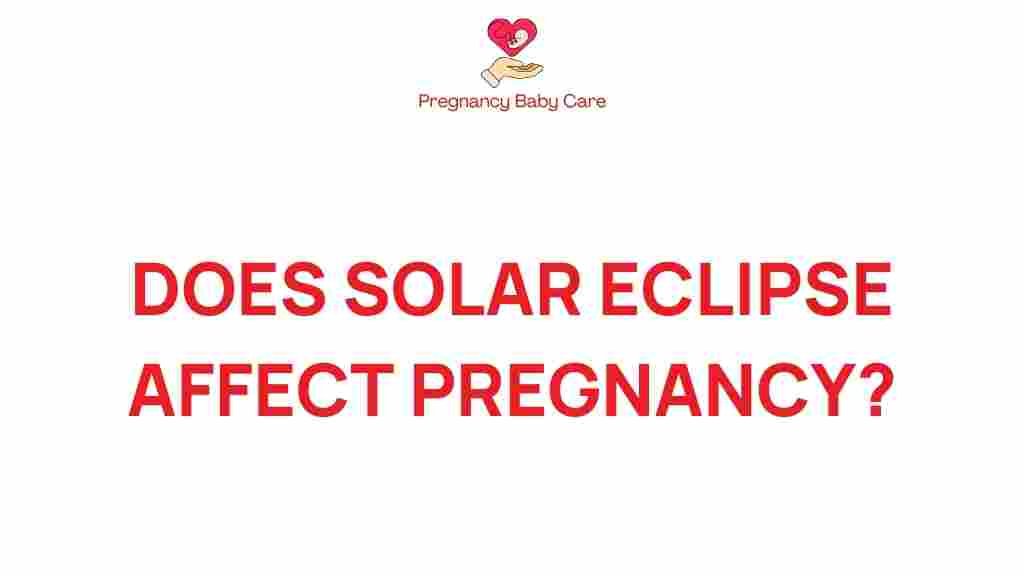The Surprising Impact of Solar Eclipses on Pregnancy
Solar eclipses are awe-inspiring celestial events that captivate the imagination of people worldwide. But did you know that these phenomena might have significant implications for pregnancy and maternal wellness? In this article, we will explore the potential health effects of solar eclipses on expectant mothers, delve into the realms of astrology and myths, and examine the scientific research surrounding these extraordinary events. Our goal is to provide a comprehensive overview of how solar eclipses can influence pregnancy.
Understanding Solar Eclipses
A solar eclipse occurs when the Moon passes between the Earth and the Sun, temporarily blocking the Sun’s light. This cosmic alignment can have varying effects depending on the type of eclipse: total, partial, or annular. Each of these events can be a source of wonder, but what about their impact on pregnancy?
Health Effects of Solar Eclipses on Pregnancy
Many cultures have long held beliefs about the effects of lunar and solar phenomena on health and fertility. In particular, pregnant women have often been cautioned against looking directly at the sun during an eclipse. Let’s explore some of these beliefs and the scientific basis behind them.
- Increased Anxiety and Stress: Some studies suggest that solar eclipses can cause heightened anxiety and stress levels. For pregnant women, stress is known to impact maternal and fetal health.
- Sleep Disruptions: The unusual darkness during a solar eclipse can disrupt sleep patterns, which is crucial for pregnant women who need adequate rest.
- Astrological Beliefs: According to astrology, solar eclipses can signify major changes and new beginnings. Pregnant women may feel these shifts acutely, impacting their emotional and mental health.
Myths and Misconceptions About Solar Eclipses and Pregnancy
Throughout history, various myths have emerged regarding solar eclipses and their impact on pregnancy. Here are some common misconceptions:
- Myth 1: Pregnant women should not watch a solar eclipse. While it’s true that viewing an eclipse without proper eye protection can be harmful, the eclipse itself does not directly harm pregnancy.
- Myth 2: Solar eclipses can cause birth defects. There is no scientific evidence to support this claim; however, the stress associated with an eclipse could have indirect effects on maternal health.
- Myth 3: Astrological signs change during an eclipse, affecting the baby’s personality. While astrology can offer insights and guidance, it should not dictate prenatal care or health practices.
Scientific Research on Eclipses and Maternal Wellness
While much of the discussion surrounding solar eclipses and pregnancy is rooted in tradition and myth, scientific research provides a different perspective. Here are some key findings:
- Stress and Fetal Development: Research indicates that high levels of maternal stress can negatively impact fetal development. Therefore, the anxiety surrounding solar eclipses could be a concern for pregnant women.
- Hormonal Changes: The sudden changes in light and temperature during an eclipse could potentially influence hormonal balance, although more research is needed to establish a direct link to pregnancy.
- Behavioral Patterns: Some studies have suggested that significant celestial events can alter human behavior, leading to changes in sleep, mood, and overall health.
Astrology and Solar Eclipses
Astrology enthusiasts often believe that solar eclipses herald significant changes in one’s life, including pregnancy. Here’s how eclipses are viewed in astrological terms:
- New Beginnings: Eclipses are seen as opportunities for new beginnings, which can be particularly meaningful for expectant parents.
- Emotional Insights: Many astrologers suggest that eclipses can bring hidden emotions to the surface, prompting reflection and growth.
- Timing of Birth: Some believe that the timing of a birth during an eclipse can influence a child’s characteristics and life path.
Step-by-Step: How to Prepare for a Solar Eclipse During Pregnancy
As a pregnant woman, you may want to enjoy the experience of a solar eclipse while ensuring your health and well-being. Here’s a step-by-step guide to preparing for an eclipse:
- Consult Your Doctor: Before the eclipse, discuss any concerns you may have with your healthcare provider.
- Plan Your Viewing: If you wish to view the eclipse, ensure you have proper solar viewing glasses to protect your eyes.
- Stay Calm: Engage in relaxation techniques such as deep breathing or meditation to manage any anxiety you may feel surrounding the event.
- Limit Stressful Activities: Avoid any activities that might increase your stress levels during the eclipse.
- Document Your Experience: Consider journaling your feelings and experiences during the eclipse to reflect on the event later.
Troubleshooting Tips for Managing Stress During a Solar Eclipse
While solar eclipses can be a source of wonder, they may also trigger anxiety for some pregnant women. Here are some effective troubleshooting tips for managing stress:
- Mindfulness Practices: Engage in mindfulness practices, such as yoga or meditation, to center your thoughts and emotions.
- Stay Informed: Educate yourself about the eclipse and its timing to alleviate fear of the unknown.
- Communicate: Share your feelings with supportive friends, family, or a healthcare professional who can provide reassurance.
- Limit Media Consumption: Avoid excessive exposure to news and social media that may heighten anxiety regarding the eclipse.
Conclusion
The relationship between solar eclipses and pregnancy is a fascinating blend of science, myth, and cultural beliefs. While the celestial event itself does not pose direct health risks, the psychological and emotional effects of the eclipse can influence maternal wellness. By understanding the myths, science, and astrological beliefs surrounding solar eclipses, expectant mothers can prepare themselves effectively and enjoy this remarkable phenomenon.
Remember, your health and well-being are paramount during pregnancy. If you’re interested in learning more about prenatal care and maternal wellness, check out this comprehensive guide. Stay informed, stay healthy, and embrace the wonders of the cosmos!
For further reading on the impacts of lunar phenomena on human health, visit this informative resource.
This article is in the category Pregnancy and created by PregnancyBabyCare Team
